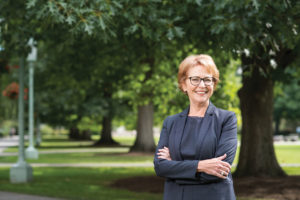Invested in law
Invested in law
With some bold decisions, investment lawyer Diane Ambler ’71 made it to the top of a male bastion.

LEGAL ADVICE: Too many women leave the legal profession in mid-career, says Ambler, who has worked to develop initiatives to help women succeed as lawyers. (Photo: J. Adam Fenster)
Years ago, Diane Ambler ’71 started writing a memoir of sorts. Every chapter began with a quotation of something that somebody had said to her at work.
But there was a hitch. Some of it was outright unprintable and all of it inappropriate and often demeaning. Ambler was trying to prove herself as a young lawyer in securities and financial services law, a male bastion in the early 1980s, when she first arrived on the scene.
“It was an outlet for my anger,” admits Ambler, who is now a partner at the international firm K&L Gates. Eventually, she abandoned the book. “Once I started writing it all down I realized it wasn’t the focus of what I was trying to achieve.” Unfocused anger, she says, “is a waste of time.”
Her time has been well spent.
Widely sought out for her expertise in financial services regulation and federal securities law, she now appears regularly on lists of best lawyers in America, the world’s leading women in business law, and others.
A big part of her success derives from a bold decision she made early in her career. Forty years ago, as a young lawyer, Ambler noticed that most of her male colleagues in securities law were preoccupied with capital formation and deal making. Ambler went for the much less sexy mutual funds law instead. A nascent field with few experienced practitioners, mutual funds proved fertile ground for Ambler to make her mark.
Ambler’s break came when the American Bar Association invited her to chair the group’s Investment Companies and Investment Advisers Subcommittee—a prestigious offer. Yet her first impulse was to turn it down. The mutual funds industry was exploding. And she had just joined an international law firm to develop and lead their new 40 Act practice (shorthand for the Investment Company Act of 1940, the major law now governing mutual funds).
She was also a single mother with a toddler at home.
“I have a lot on my plate. I don’t have time for that,” she remembers thinking at the time. “It’s a terrible idea.”
When she mentioned the offer to a male colleague, however, he simply assumed she’d take it. That assumption got her thinking. Are there ways to make it work?
She did, once she realized that she didn’t need to be one of the firm’s top billers. She also hired a live-in nanny.
Yet again, a big decision paid off.
“It completely accelerated my career in a way that I never would have anticipated, because it gave me exposure to everyone in the field,” Ambler says. It also gave her a voice to appear before regulators.
Looking back, she says, at times her rise was lonely. In her early years, women were working in what she calls “parallel play.” They didn’t see much of one another. “We simply didn’t know that there were a lot of women with the same struggles, trying to deal with the same issues.”
That’s one of the reasons she now mentors young lawyers—male and female. Starting 15 years ago on her own doorstep, Ambler helped set up a women’s group at her law firm, which now employs some 1,800 lawyers worldwide. Many of the initiatives developed by the women’s group have since been adopted as a firm-wide vision to help their female lawyers succeed.
A problem that remains to this day is that too many female lawyers leave the profession in mid-career, says Ambler, who is also a member of the executive boards of both the Women in Law Empowerment Forum and the National Association of Women Lawyers.
“We need to make sure they have options, good mentoring, and the institutional backup needed to be successful.”


